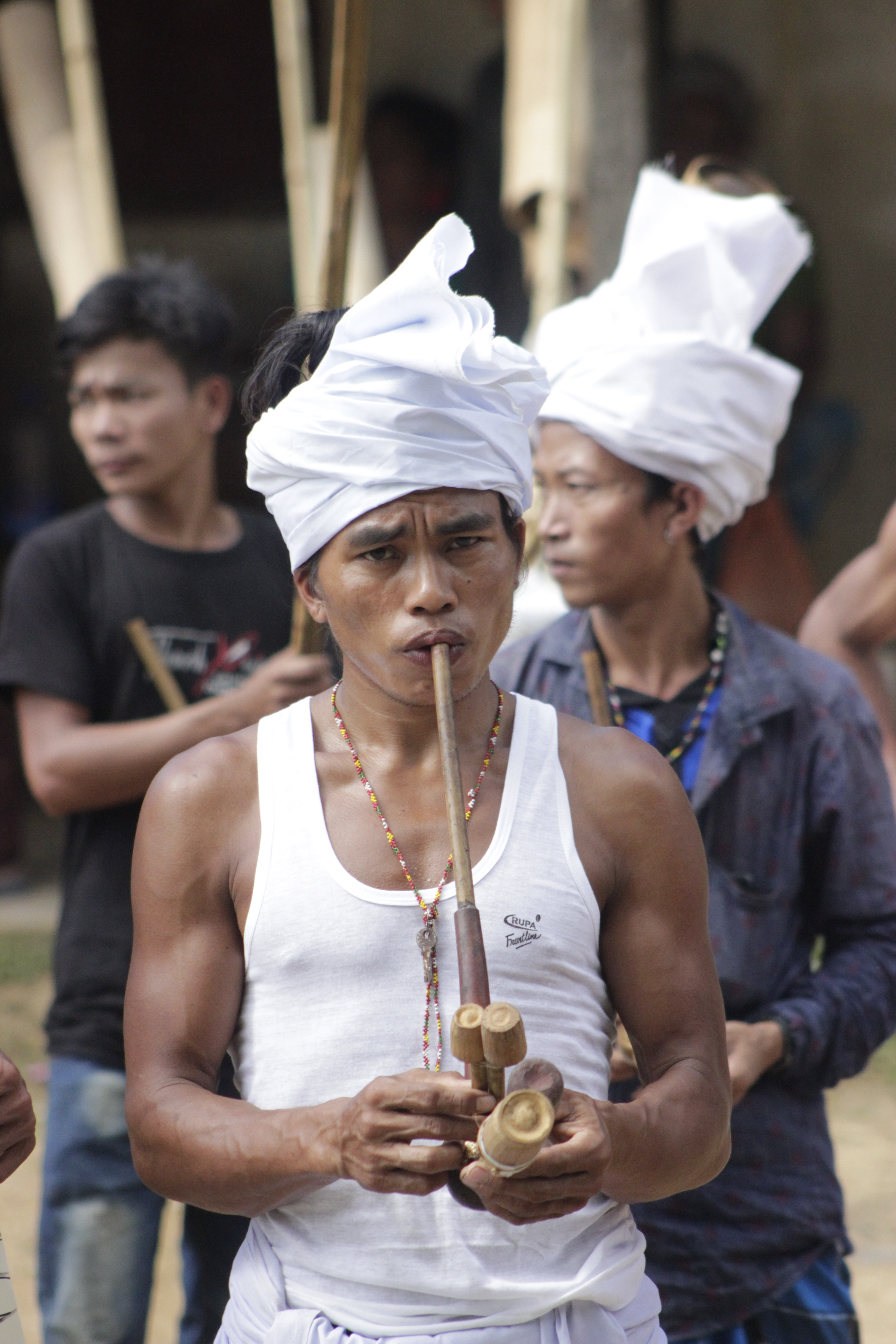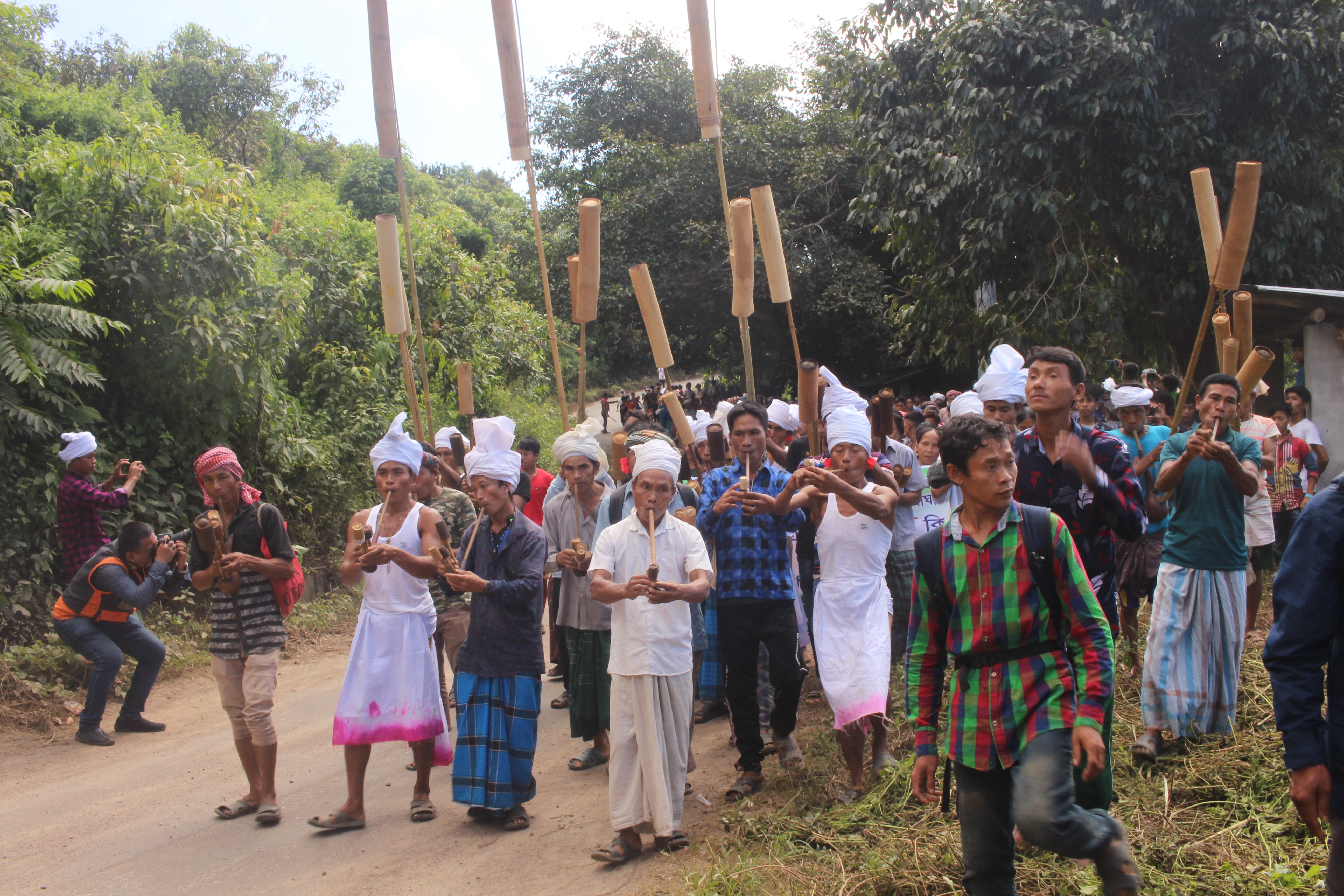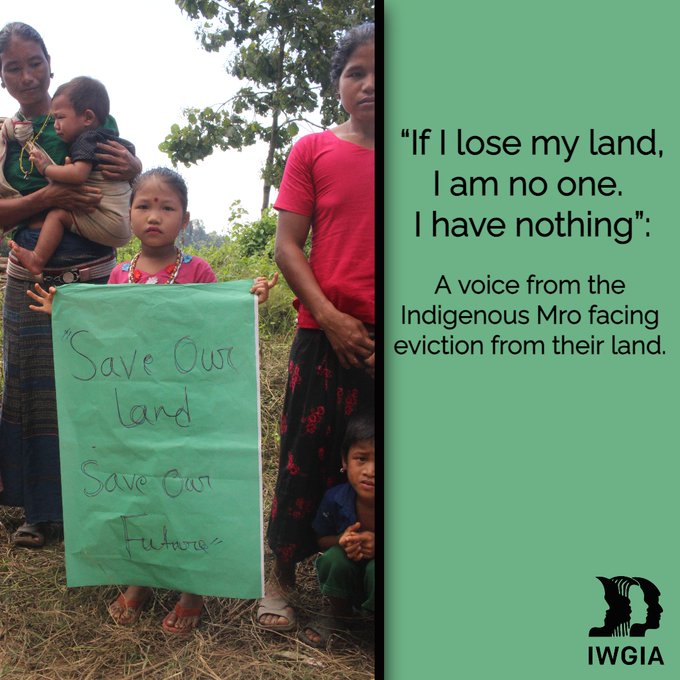WRITTEN ON 27 APRIL 2021. POSTED IN BANGLADESH
The Mro People of the Chittagong Hill Tracts (CHT) in Bangladesh are under threat of being evicted from their ancestral lands with nowhere to go and everything to lose.
Returning home to Chimbuk Hill amidst the COVID-19 pandemic to help the village’s needy, Abani*, a youth from the Indigenous Mro community received an alarming text message from his friend.
-Do you recognise these flags?
-No, what is that?
-They are going to take our land.
Foreign red flags and pillars were scattered around the lush hills of Chimbuk, and friends soon explained what was happening: A 5-star resort and amusement park was set to be built on their ancestral land. The land from which they eat, sleep, work, pray, where their family rests, and have done so for generations. This land —land that holds everything they know— will be replaced by luxury villas, swimming pools and cable cars. Along with these changes, they know from bitter experience, come large dams, a deepening water crisis, environmental destruction and the loss of what’s left of the Mro identity.
This is a reality that most people don’t see or worry about, let alone have to experience, yet for thousands of Indigenous people living in these villages and the many other Indigenous Peoples around the world— this is a recurring nightmare.
For decades large companies have taken advantage of the marginalised Indigenous Mro, whose rights are unrecognised by the constitution of Bangladesh, by grabbing the land they depend on. This land is the main source of livelihood for these Indigenous communities who traditionally practice jum cultivation, a highly sustainable form of rotational farming that requires big areas to be left unused in order to regenerate. With less land, food production from jum cultivation is no longer sufficient and many Mro People with remaining land have resorted to growing fruit orchards. Dating back to the 1970s, Mro People’s land has been grabbed and replaced with clean, sterile rows of foreign rubber and pulpwood plantations, but the situation got unimaginably worse in 2006 when the Bangladesh army claimed 11,445 acres of land for military training use, evicting 10 Mro villages and displacing hundreds from their own land.
Abani was still young during the 2006 evictions but recalls the loud cries of his people and elders, no longer able to walk, being carried away by young community members. “The elders were crying ‘No, I don’t want to leave my own land, my family members, my father and mother are buried here in this land. How can I leave this land? I don’t want to.’ But they had to leave…forced off their land, for months they had to stay with no shelter during the winter season. It was tough for them to survive that time.”
The army who took the land from these people are now leasing parts of it back to them at high prices. When a harvest is successful, villagers no longer have free access to sell the food in town but must often sell it to a mediator who resells it for a significantly higher price. Others work for low daily wages on the very land that was stolen from them. Now, 15 years later, with little remaining fertile land for food and the constant spectre of water scarcity looming over them, the nightmare continues to worsen. Amidst the global pandemic that is confining many to their homes, the Mro People are losing them.
What is at stake?
The Mro depend on the land and forest for food, work, water, and other natural resources such as wood for building and if this construction happens their “lifestyle, practices, all these things, all these long years of our history, everything will be gone.”
Forest loss and Traditional Knowledge:
The Indigenous Mro living in these villages hold generations of knowledge about the natural forest, its plants, and how to preserve it. The people’s “hearts are there.” As with most Indigenous Peoples, it is the elders who hold the majority of this invaluable knowledge about the land and pass it onto the next generation. Abani shares that his father and older brothers are currently learning these things, “but if the land doesn’t belong to us, if the land is gone, then there will be no ways for us to learn it from them,” so “every knowledge about these herbs and plants will be lost.” The lack of sufficient access to healthcare means the Mro People are depending on medicinal plants for much of their health needs. For example, Abani shares, when someone has a broken or fractured bone, the villagers often apply a herb called ‘Huttom’ to a piece of fabric and wrap it tightly around the injury. This, he claims, can heal the bone without needing to see a doctor, who is often too far away.
While new generations are trying to adopt a more modern lifestyle, this knowledge remains a central part of Mro culture and livelihood. Knowing they depend on the forest, Mro People are keen to learn from their elders— something that won’t be possible if the land is lost. It is a disaster that most of us cannot picture: like large libraries, containing everything you know and everything you are, being deliberately burnt down, and nobody is doing anything to put out the fire.
Religion and cemeteries:
Despite replacing gardens and farmland with concrete buildings, the construction of this hotel would eliminate the spiritual and religious areas of the Mro. Places of religious worship, as well as cemetery grounds of family and ancestors, will be lost, taking a large piece of Mro identity with it.
Even ceremonial customs such as the playing of the traditional ‘plung’ flute risk disappearance along with the land. This is a special flute made from bamboo that holds a central role in Mro lifestyle, culture and beliefs. It is played during celebrations, festivals and other common activities in the communities. With the loss of the bamboo forest, their traditional knowledge and even spiritual identity, age-old traditions like the ‘plung’ flute risk being no more than a memory.

Photo: Mro man playing the plung flute.
Women and clothing:
The army’s occupation of Mro ancestral lands and the growing tourism in the area has left Indigenous women vulnerable and insecure. The traditional handmade clothing that many Mro women wear offers less coverage, and having a bare upper body is customary and still seen amongst the Mro today. However, there are rising numbers of “mainstream” Bengali and army people who visit their villages and condemn, laugh at, and even sexually abuse these women because of their clothing.
Sexual abuse and other forms of violence against Indigenous women is a huge problem in Bangladesh, with at least 54 reported cases of which 19 were in the CHT. With perpetrators rarely being held accountable, the social stigma and other cultural barriers, many of these cases go unreported. “So the building of these hotels is a big risk for us…lots of incidents like this will happen, lots of people will come from outside and they will not respect our women, they will sometimes do bad things. We do not have the authorities to help us with this. I mean, they do not do anything… So they [the women] decide to remain silent.”
Instead, Mro women are pressured to move away from their culture and identity and assimilate themselves into foreign mainstream ways of dressing. Abani laments over the disrespect of tourists that laugh at the women and make the whole community feel embarrassed. “This makes us sad because they [the women] used to be free in their land, they used to wear whatever they want to. So why do you have to force others to wear something they don’t like?” The loss of this land will force the Indigenous women to change their ways completely.

Photo: Mro women protesting against the hotel construction.
Children with a dark future:
Childhood should be carefree, full of joy and a bright future, but for many Indigenous children, including the Mro, it is a life in poverty without access to education and basic health services. Amidst the ongoing spread of COVID-19, a sudden outbreak of measles in 2020 claimed the lives of 10 Indigenous children in the CHT while at least 300 more were affected. 33 Mro children were infected and a four-month-old Mro baby lost her life. While the PM blamed Indigenous Peoples’ superstition for the outbreak of measles, it is the lack of accessible healthcare facilities and support in these villages that leave the Indigenous Peoples and their children at risk. With great frustration Abani explains how state authorities “want to build lots of roads and resorts here and do not even want to ensure these children education first. They do not build hospitals or schools…so the children are always remaining in the dark,” and “it is easy for them [the authorities] to grab the land from the people who don’t even know how to read or speak the national language or to write it. That’s what happens.”
In a stretch of about 35 Mro villages, there is not a single primary school. Of course, he explains, “if there is no primary school there will be no high school,” so “thousands of children are being deprived of basic education”. Authorities claim the resorts will make them profitable and give them good jobs, but Abani is convinced that not a single penny will be provided to these people. Instead, with the land and opportunities this resort would take away from the villagers, people will grow even poorer and will not be able to afford to send their children to the far-away schools. As a result, children stay at home with their parents working in the farmland they have left to grow gardens and fruit farms.
So if the children cannot go to school, and they lose the land they spend their days working on, where will they go? The answer is quite simply: “They have no place to go.”
Mro identity:
Abani’s message is clear: “To me my land is my life. Without my land there is no way to live happily. The land where I grew up, every story I heard…every word I learnt from my mother and my ancestors, everything is related to land. If I lose my land, I am no one. I have nothing.”
“I think the Mro People are losing their identity when they are losing their land.” Language, lifestyle, and even thoughts are related to the land, “going to a new place to start a new life you have to start everything again. So the practices that have gone through generations is being lost and new generations are not able to learn these things. In this way they [the youth] are losing their identity too.”
Abani describes how the loss of nature has affected his language. The words used to describe the old trees and the beautiful birds that once covered the land are no longer used, and “along with the trees disappearing, the words for them disappear too.” Authorities are already renaming the surrounding hills and lands in their own words, overshadowing traditional names related to Mro beliefs and culture with foreign names that are not understood by local people and distance their feeling of home. Surely, this will increase if the hotel is built. Abani offers the example of ‘Shung Nam Kua Rum’, a traditional name meaning ‘the hill where the ancestor gods live’ that is being changed into ‘Chandra Pahar’, which is not the Mro language. “So by losing our lands…our language is also gone.” Language loss is a worldwide problem for Indigenous Peoples, so serious that the United Nations has launched a global task force for making a decade of action for Indigenous languages.

Photo: Mro community members protesting in the form of an organised cultural event
How is this happening?
Although Officials of the Army Welfare Trust and the giant business entity, the Sikder Group- R&R Holdings, insist they are “only using 20 acres” of land they have “legally” leased from the Bandarban Hill District Council, 20 acres can neither be referred to as “only” nor was the land claimed legally. Some villagers visited the Mro Headman of the area who explained he had given up just 5 acres of land in a verbal agreement. Further, legal transactions require official papers, not verbal agreements. Some villagers have demanded to see the papers that the authorities claim to have, but the Hill District Council had nothing to show. Not only is the building going against the Peace Accord and CHT Regulation 1990, but a circulating statement by the Chief of the Chakma Raja in the CHT, Raja Devasish, states that Bandarban Hill District Council never held any legal title to the land the business entity claims to have leased, and thus “If it did not have any legal land, it could not have legally transferred the title to the land”. Also, these 20 acres discussed do not match the business entity’s scattered red flags and large-scale plans convincing villagers that this project will require the building of a dam, pipelines, the cutting down of forests and it has rather been estimated the construction will affect 800-1,000 acres of lands belonging to Indigenous Peoples.
Since the end of 2020, when news of the hotel construction was announced the Mro community organised a cultural event and other forms of protests, including a 30km march on February 7th, where protesters held placards calling for the construction to be stopped. However, following the peaceful long march, construction authorities gathered Mro People from another village to counter-protest against the Mro People defending their land rights. Many villagers were misled and unaware of the reason they were being taken to the town while other political leaders of these villages have been enticed or threatened into working with the army. Putting Indigenous Peoples against each other is a common tactic, used by officials around the world to claim a moral license and move their own interests ahead. Beyond the emotional betrayal, these actions have also been amplified by media with strong ties to government and the settler cause, who have used it to announce that the Mro People also want the luxury hotel now. “But all that is a lie. Everything is lies and it’s being published in the newspaper. We will never say we want a 5-star hotel. Before that we want education and health services.”
These peaceful protesters have been referred to as “terrorists” and are risking their safety to protect their land. Despite the fear and ongoing harassment, for many, the alternative is worse. “I have to keep saying these words, that this is illegal. My strength comes from the fear that we will be lost someday.”

Photo: Protestors at the 30km Long March that was held on the 7th February 2021.
What can be done?
The international community has a responsibility to respond when authorities are dealing unjustly with their citizens. While the Mro community is speaking up against these evictions, they are dependent on the international voices of human rights organisations in order to be heard. “The government doesn’t listen to us, but they listen to the international community.”
Efforts including the UN official communication to the Prime Minister of Bangladesh, to the Bangladeshi Army, and to the companies involved, the UN public press release condemning the violations, and human rights organisations making public statements have made a difference. However, the Mro People are dependent on more organisations stepping up and condemning the ongoing injustice.
Private individuals can also use their social media platforms to spread the word and make the Mro Indigenous Peoples heard. Whether or not we let these construction plans proceed unnoticed determines the future of the Mro communities at Chimbuk Hill.

Photo: Young Mro girl joining the fight for her future
*Due to the sensitivity of this issue, the identity of the interviewee will remain anonymous and the name, Abani, has been used instead.
Photos: All photo credit belongs to the interviewee.
Tags: Land rights, Human rights
